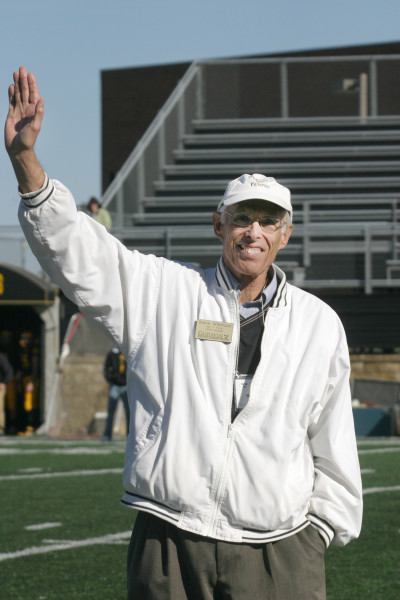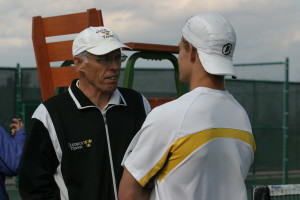Steve Wilkinson, former Head Men’s Tennis Coach and Founder and Director of Tennis and Life Camps, passed away on January 21, 2015 after battling cancer for nearly seven years.
Wilkinson started out his tennis journey as a distinguished tennis player. He was the No. 1 singles player at the University of Iowa and was one of the top tennis players in the Big Ten. He was ranked No. 1 in the U.S. Tennis Association (USTA) in four senior divisions.
Wilkinson originally came to Gustavus to be a religion professor, and despite his own accomplished collegiate tennis career, he had no intention of coaching tennis. When Gustavus lost their tennis coach, Wilkinson stepped up and took on the role of Head Men’s Tennis Coach—a position he held for 39 years.
As Head Men’s Tennis Coach at Gustavus, Wilkinson became the winningest collegiate tennis coach in history, leading the Gusties to a 334-1 MIAC record in his 39 seasons at the helm of the Gustavus Men’s Tennis program. He retired after the 2009 season, after his teams won Division III Championships in 1980 and 1982. Wilkinson’s teams won Minnesota Intercollegiate Athletic Conference (MIAC) titles in 35 of his 39 years as Head Coach. Six of Wilkinson’s players won national doubles titles and four of his players won national singles titles.
Wilkinson took his tennis experience one step further when he founded Tennis and Life Camps along with his wife Barbara in 1977. For over 35 years, the Wilkinsons used tennis as a metaphor for life as they taught campers about the Three Crowns of Excellence—attitude, effort, and sportsmanship—the three keys to success on and off the tennis court.
“I think Steve’s brilliance was in the simplicity of his message. That you could encapsulate something that everybody could do in these three simple acts. He always told people to focus on the things you can control, and let go of the rest. You can’t control whether or not you win, you can’t control how well you play. The things you can control are your attitude on the court, the full effort that you give, and your sportsmanship or the way that you treat others. The simplicity of it is that you can choose these things,” current Director of Tennis and Life Camps Neal Hagberg said.
It was through Tennis and Life Camps that current Head Men’s Tennis Coach Tommy Valentini met Wilkinson.
“He stands for the best of Gustavus and what Gustavus’ values are and he lived it out beautifully as he lived a tremendous life of service.”—Tommy Valentini
“I first met Coach in the summer of 1995 at Tennis and Life Camp. I came here for three summers and that was the start of me being with him for what has been over half of my life. I looked at going to school at a lot of different places, but the opportunity to be around him and to learn from him on a daily basis I think was the biggest part of my decision to come to Gustavus. The chance to come here and play for him was huge,” Valentini said.
Valentini played for Wilkinson for four seasons, worked with him at Tennis and Life Camps during the summers, and stayed in contact with Wilkinson throughout graduate school. When Valentini returned to Gustavus, he was an Assistant Coach under Wilkinson, before taking over the program in the 2010 season.
“One of the neat things about being with Coach in all of those capacities is that I got to experience a lot of everyday, ordinary moments with him and I cherish those memories with him the most. I got to be with him at a lot of different phases of both of our lives and that created a lot of really special moments and conversations. I got to see how kind and how true to himself he was in all of those ordinary moments and also how incredibly masterful he was in carrying out his values in the most challenging moments,” Valentini said.
Vice President of Marketing and Communications Tim Kennedy echoed Valentini’s sentiments about Wilkinson’s adherence to his values, even in the face of adversity.
“When things are going well in someone’s life, it’s pretty easy to be the best version of yourself. When things aren’t going well in someone’s life, that’s when you find out their true character. Steve Wilkinson was the same person with the same smile and the same zest for life when he was very seriously ill with cancer as he was when he was winning National Championships and that’s the testament of the man,” Kennedy said.
Wilkinson had an undeniably enormous impact on Gustavus. He shaped the tennis program into what it is today, he was instrumental in the fundraising and building of the Swanson Tennis Center, and in 2010 he and his wife gifted Tennis and Life Camps to the College. Beyond these accomplishments, Valentini and Kennedy agree that Wilkinson reflected the very essence of the College.
“The extent of the reach of Steve’s influence is beyond quantification or comprehension. He stands for the best of Gustavus and what Gustavus’ values are and he lived it out beautifully as he lived a tremendous life of service,” Valentini said.
“His legacy is sportsmanship. He changed the rules and got people thinking about sportsmanship before anyone else did.”—Neal Hagberg
“If you look at the five core values of this college, they are the five core values of Steve Wilkinson. He lived the five core values—community, excellence, justice, service, faith. I don’t know if one person in the history of our institution has lived out those core values more than Steve Wilkinson. He was Gustavus in an individual,” Kennedy added.
Wilkinson’s legacy extends far beyond the borders of Gustavus’ campus. When Wilkinson passed away, all the major tennis organizations paid tribute to the legendary tennis coach. The International Tennis Association (ITA) immediately wrote a story about Wilkinson and his story graced the front page of the United States Tennis Association (USTA) publication.
Hagberg believes that Wilkinson is known in the tennis community because he changed the rules of the game.
“His legacy is sportsmanship. He changed the rules and got people thinking about sportsmanship before anyone else did. That’s why he started Tennis and Life Camps—he wanted to make tennis a metaphor for how we can treat people on and off the court and in doing so, he impacted the world,” Hagberg said.
Kennedy believes Wilkinson impacted more than just the Gustavus community and the tennis community.
“There are a few times in your life where you meet someone who you know stands above everybody else, when after you meet them, you know that wasn’t a typical person—that person was extraordinary. If you meet three of those people in your life, that’s pretty amazing. For Steve, it was always about the game and the way it was to be played, and not about winning, but all he ever did was win. When you can accomplish that, I think you have done something extraordinary, and that’s what he did and I think that’s what his legacy is—in tennis, at Gustavus, and in his own life. We have witnessed something that you just don’t witness everyday,” Kennedy said.
Wilkinson’s influence is unquantifiable, except in the smile the mention of his name brings to faces, in the memories people will share of the legendary tennis coach for years to come, and in the amount of love for their mentor, coach, and friend that his successors expressed.
“I loved him so much and I miss him. And I’m really grateful to have known him,” Hagberg concluded.
-Linnea Moat

